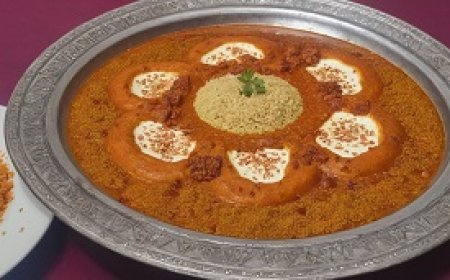Authentic Arab hospitality customs
Authentic Arab hospitality customs are an integral part of the cultural and social heritage of the Arab peoples. Arab Hospitality Customs are an essential tool for communicating and expressing generosity and welcoming guests. These customs reflect basic values and principles in Arab society, such as respect, solidarity, and social solidarity. Arab hospitality customs are characterized by many aspects that highlight their beauty and authenticity. One of the most important of these customs is a warm welcome to guests, as this is considered an expression of respect and appreciation. When the guest arrives, he is offered dates and water as a symbol of welcome, and hospitality is extended to him in the best possible ways. Arab hospitality customs also include serving food generously and generously. Serving food is an integral part of Arab hospitality, as food is a way to fill stomachs and unify social relationships. The food is served generously and sumptuously, with an emphasis on providing a variety of foods to satisfy all tastes. In addition, Arab hospitality customs include providing comfort and proper reception to guests. Guests are given a comfortable place to sit and relax, and all their needs are ensured with care and attention. Entertainment and laughter are considered one of the aspects of authentic Arab hospitality, as providing a fun and welcoming atmosphere is part of the hospitality experience. Entertainment and social events are organized to bring joy and pleasure to the guests, reflecting the care and concern for their comfort and happiness. In general, authentic Arab hospitality customs are one of the most important elements that characterize Arab culture and express the basic values of generosity, giving and solidarity. It is an effective tool to enhance communication and build strong social relationships, and reflects the friendly and hospitable Arab spirit.

Authentic Arab hospitality customs represent an integral part of Arab culture, as they reflect deep values of generosity, welcome, and concern for guests. These customs are characterized by hospitality and generosity, as providing hospitality is considered a social duty and an honor for the host, and the guest is considered the essence of the visit. These customs are manifested in providing hospitality in multiple forms, from receiving guests with a warm laugh to offering food and drink generously. These customs are considered one of the most important aspects of cultural communication in the region, as they convey a long heritage of welcome and openness to others.
Values of Hospitality in Arab Culture
Hospitality values are an essential part of Arab culture, as they are considered important values that guide the behavior of individuals and communities in dealing with guests and visitors. These values reflect the historical and spiritual depth of the Arabs and express the fundamental characteristics of sacrifice, generosity, and welcome. Here is a detailed description of the values of hospitality in Arab culture:
1. Generosity:
Generosity is one of the key values in Arab hospitality, where warm reception and assistance to guests are considered an integral part of the culture. Arab generosity reflects the host's willingness to provide the best services and meet the guests' needs without any request.
2. Hospitality:
Hospitality is about accepting the guest with simplicity and warmth, and providing a warm and comfortable environment for them. Arab hospitality expresses care and respect for the guest, making them feel comfortable and welcomed from the moment they arrive.
3. Respect:
Respect is essential in dealing with guests in Arab culture. Respect involves treating the guest with kindness and appreciation, and respecting their identity, culture, and beliefs.
4. Sacrifice:
The Arab value of sacrifice is evident in the deep concern for the guest's comfort and satisfaction, even if it requires sacrificing some personal resources or time. The Arab value of sacrifice is a manifestation of the desire to show generosity and kindness.
5. Warmth and Affection:
Arab reception is characterized by warmth and affection, where the host shows the guest feelings of pride and affection. Laughter, friendly conversations, and personal attention are exchanged to enhance social bonds.
6. Bravery:
Providing protection and support to guests is part of Arab hospitality values, where the host shows bravery in providing support in times of need and ensuring the safety and security of guests.
7. Friendliness:
Friendliness is an integral part of the Arab hospitality experience, where the host shows warmth, care, and exchanges friendliness and kindness with the guest.
8. Flexibility:
Arab reception is characterized by flexibility and adaptation to the guest's needs, as the host seeks to meet their requests and provide services that meet their expectations.
9. Benevolence:
Benevolence is a key element in Arab hospitality, where the host shows generosity by offering food, drinks, and gifts to guests without expecting anything in return.
10. Loyalty:
Loyalty and commitment to social relationships are an essential part of Arab hospitality values, as the host seeks to build long-term relationships with guests and maintain these relationships with care and appreciation.
Form of Hospitality in Traditional Arab Families
In traditional Arab families, hospitality is considered one of the most important values and traditions that distinguish Arab culture, and the family is the place where many aspects of hospitality and welcoming guests are embodied. Here is the form of hospitality in traditional Arab families:
1. Warm Welcome:
When the guest arrives at the house, they are warmly welcomed and shown interest and appreciation. Family members express their happiness with their visit and express their willingness to offer help and comfort.
2. Offering Hospitality:
Hospitality in Arab families includes offering food and drinks generously. Providing food is an integral part of the hospitality experience, and offering the guest delicious and varied meals is a sign of respect and appreciation for their visit.
3. Personal Attention:
Arab family members show personal interest in the guest, listening to their stories and showing concern for their problems and needs. Offering personal attention is an essential part of the hospitality experience.
4. Sitting Together and Friendly Conversations:
The guest in the Arab family has the opportunity to sit with family members and exchange friendly conversations and cultural experiences. This aspect of the social experience is an integral part of hospitality.
5. Offering Gifts:
At times, Arab family members show their appreciation for the guest by offering gifts. Gifts may be simple, such as flowers or sweets, and express respect and appreciation for the guest's visit.
6. Providing Comfort and Stability:
Arab families seek to provide a comfortable and stable environment for the guest, ensuring their comfort and safety during their stay.
7. Respect for Privacy:
The guest in the Arab family enjoys privacy and non-interference in their personal affairs, as their space and right to relax and enjoy their time without any pressure are respected.
8. Offering Advice and Support:
Family members may offer the guest advice and support in various life situations, seeking to provide helpful advice and guidance.
9. Dedication to Guest Service:
Traditional Arab families show dedication to serving guests, making great efforts to ensure an enjoyable and comfortable stay for the guest and meeting their needs with sincerity and dedication.
10. Permanent Warmth and Affection:
After the guest leaves, the connection and communication continue between family members and the guest, showing permanent warmth and affection, and maintaining the relationship through social communication and repeated visits.
Impact of Hospitality on Tourism in the Arab World
The impact of hospitality on tourism in the Arab world is of utmost importance, as hospitality is an integral part of Arab culture and a key component of tourists' experience in the region. Here are some points illustrating the impact of hospitality on tourism in the Arab world:
1. Unique Visitor Experience:
Arab hospitality is considered one of the most important elements that distinguish the tourist experience in the Arab world. Arab hospitality means warm welcome and exceptional generosity towards guests, making tourists feel comfortable and enjoy a unique experience during their stay.
2. Enhancing the Destination Image:
Offering Arab hospitality plays a vital role in enhancing the image of tourist destinations in the Arab world. When tourists feel welcomed and warmly received, their positive impression of the destination increases, making them more likely to return or share a positive story about their experience.
3. Promoting Cultural Tourism:
Arab hospitality contributes to promoting cultural tourism in the Arab world. Tourists have the opportunity to discover local culture and traditions by interacting with hosts and participating in traditional activities such as enjoying local food and engaging in cultural events.
4. Supporting the Local Economy:
The tourism sector is one of the key sectors in the Arab world's economy, and Arab hospitality provides an opportunity to support the local economy by providing employment opportunities for local residents in areas such as hotels, restaurants, and other tourism services.
5. Increasing Religious Tourism:
Arab hospitality plays a crucial role in increasing religious tourism in the Arab world, as Muslims from around the world flock to perform religious rituals and visit holy sites, enjoying Arab hospitality during their visits.
6. Enhancing Cultural Understanding:
Offering Arab hospitality contributes to enhancing cultural understanding between different cultures. When tourists interact with local communities and participate in their daily experiences, they can gain a deeper understanding of Arab culture and appreciate local values and customs.
In this way, Arab hospitality plays a vital role in attracting tourists and promoting tourism in the Arab world, contributing to supporting the local economy and increasing understanding and cultural communication across borders.
The Future of Hospitality in the Arab World
The future of hospitality in the Arab world reflects the challenges and opportunities facing this vital sector in the coming years. Here is a comprehensive look at the future of hospitality in the Arab world:
1. Technological Advancement:
Technological advancement is one of the most important factors that will affect the future of hospitality in the Arab world. From online booking applications to smart technologies in hotels and resorts, technology is expected to improve the tourist experience and increase the efficiency of hospitality services.
2. Environmental Sustainability:
Awareness of the importance of environmental sustainability in the tourism sector is increasing, and many hospitality institutions in the Arab world are expected to adopt principles of sustainable tourism and provide services that align with sustainable environmental practices.
3. Cultural and Historical Tourism:
The Arab world is a major destination for cultural and historical tourism, and these trends are expected to continue in the future, making Arab hospitality play a significant role in attracting tourists and providing unique and distinctive experiences.
4. Demographic Changes:
Demographic change, with an increase in population and changes in population composition, is an important factor in shaping the future of hospitality in the Arab world. This requires directing attention and efforts towards meeting the needs and expectations of different tourist segments.
5. Innovation and Development:
Innovative thinking and development in the field of hospitality are crucial for survival and prosperity in the future. Hospitality institutions in the Arab world are expected to invest in developing unique hospitality experiences and offering creative services that attract tourists.
6. Impact of Global Events:
Global events such as economic, health, and political crises can affect the future of hospitality in the Arab world. This requires hospitality institutions to be prepared to adapt to potential challenges and develop strategies to address them.
7. Infrastructure Development:
Infrastructure development is one of the most important factors affecting the future of hospitality in the Arab world. Providing appropriate infrastructure, including roads, airports, hotels, and other tourism facilities, is necessary to attract tourists and meet their needs.
Through strategic thinking and preparation for potential challenges, hospitality in the Arab world can continue to grow and evolve, contributing to supporting the local economy and enhancing understanding and cultural communication across borders.
```html
Conclusion
When we examine the authentic Arab hospitality, we find that it represents an integral part of traditional Arab culture, reflecting deep values and principles of social relationships and solidarity among individuals in the Arab society. By focusing on generosity, appreciation, respect, and providing comfort and hospitality to guests, the role of Arab hospitality customs in enhancing social communication and building strong relationships among individuals becomes evident.
In conclusion of this discussion, we find that Arab hospitality customs are not just a collection of traditions and habits, but they are an essential essence of Arab identity. They reflect the spirit of cooperation and solidarity, and highlight the values of generosity and kindness that distinguish Arab society. Despite the modern era's development and changes in daily life, preserving these cultural values and ancient traditions remains a vital part of preserving and promoting Arab identity.
The continuity of Arab hospitality customs poses a challenge in the face of modern social and cultural changes. However, it remains necessary to preserve these values, promote them, and reinforce them among the younger generations. Arab hospitality is not just a superficial aspect of culture; it is an essential part of the true Arab identity, which must be preserved and enhanced as a cultural heritage that Arabs can be proud of.
It is worth mentioning that Arab hospitality extends beyond the boundaries of family and home to encompass the entire community. It reflects the spirit of cooperation and solidarity in Arab society, and enhances social relationships among individuals and communities. With the expansion of social communication in the modern age, authentic Arab hospitality can be a bridge for understanding and communication between different cultures, thereby contributing to promoting peace and global understanding.
In conclusion, the role of authentic Arab hospitality customs remains vital and important in building Arab communities and enhancing social and cultural ties. As time passes, we all must contribute to preserving these values and passing them on to future generations, as they are an integral part of our Arab identity and rich cultural heritage.
Sources:
2- Arab America
3- Arab News
5- Al Arabiya
What's Your Reaction?
















































































































